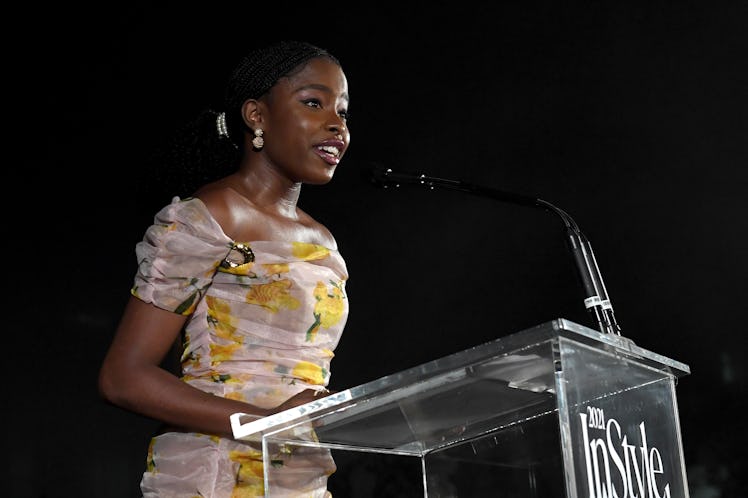
Amanda Gorman Explained Why Good Leaders Are Emotional, And I Love It
There’s a lot to unpack, in a good way.
After she became the youngest inaugural poet in U.S. history when President Joe Biden was sworn into office in 2021, 23-year-old writer Amanda Gorman was caught in a whirlwind of media attention, which quickly launched her to icon status. Now, she’s continuing her upward trajectory as one of TIME’s Women of the Year, along with Amal Clooney, Kacey Musgraves, Allyson Felix, and more. While she revealed she doesn’t want to be seen as a symbol or a savior in her Mar. 2 interview with TIME, she’s still coming into her power through leading by example. Amanda Gorman's quote about emotion as a leadership trait is so inspiring, and it includes lots of self-love.
Gorman explained that for her, being a good leader doesn’t mean using her platform to dominate or control. Rather, she prefers to lead with love by encouraging people to embrace their own voices, identities, and emotions. “The type of leadership that I like to participate in really leans into my femininity,” she told TIME for her Woman of the Year interview. “Things like empathy, compassion, listening, tenderness, sharing power — you risk being called ‘too emotional,’ but I like to lean into those characteristics because we need to see more of that in the world.” She also prioritizes rest, self love, and her emotional well-being above productivity: “If I could do one thing in this life,” she said, “naps are where I belong.” I hear you, Amanda.
Gorman’s softer perspective is a huge step away from traditional ideas of what leadership looks like. In a world where many political figures, business owners, and even artists are often praised for their tenacity and aggression, Gorman’s approach to power feels different. However, she doesn’t want her audiences to invest all of their faith into her. Rather, she encourages people who look up to her to overcome their fears, and to invest their faith within themselves. “Girls have spent so much of their lives being told to be seen and not heard, and you can see how they might bring that fear to the page,” she told TIME. “So the core aspect of any conversation I have with someone who wants to start writing is: How do you stare at the monster of fear, know that it’s there, but not let it take up so much space?”
The poet has also talked about turning so-called “weaknesses” into strength. In her February 2021 interview with Michelle Obama in TIME, she told the former first lady how, growing up, she considered her speech impediment a shortcoming. She noted how it was already “daunting” enough for her to speak in public as a Black girl, but her speech impediment added an extra layer of insecurity. “Now I really look at it as a strength,” she continued, “because going through that process, it made me a writer, for one, because I had to find a form in which I could communicate other than through my mouth, and two, when I was brave enough to try to take those words from the page onto the stage.”
While Gorman herself may shy away from being seen as a leader, she’s still an inspiration to countless young people working to find their voice in a world where it’s all too often stifled. I, for one, am thankful for how Gorman is showing the world how to turn self-perceived weaknesses into strengths.